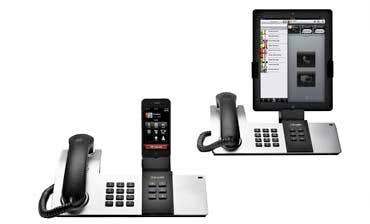ShoreTel Tackles BYOD With iPad, iPhone Dock For Enterprise Desk Phones

ShoreTel Monday made its latest move in what's been a series of leaps intended to transform Apple's iPhone and iPad into enterprise-grade communication devices.
On the opening day of the 2013 Interop event in Las Vegas, ShoreTel took the wraps off its new ShoreTel Dock, a docking station that allows the iPhone and iPad to be used as a business desk phone. The new ShoreTel Dock is meant to be used with iPhones and iPads running ShoreTel Mobility, an application suite that arms mobile devices with ShoreTel conferencing, UC, instant messaging, extension dialing and other capabilities traditionally exclusive to business phone systems.
The ShoreTel Dock enables users to leverage their ShoreTel Mobility-enabled iPhone or iPad just as they would a traditional desk phone. The dock comes with a handset and a full dialing pad and automatically charges an iPhone or iPad once the device is connected. ShoreTel said the dock also optimizes the quality of calls placed and received on Apple's devices.
[Related: Former ShoreTel Channel Head Lands At Mitel ]
According to Pejman Roshan, vice president of product management at ShoreTel, the new ShoreTel Dock, along with ShoreTel Mobility, was created in response to the burgeoning bring-your-own-device (BYOD) trend. Roshan said BYOD suggests mobile devices like the iPhone and iPad are becoming the preferred method of communication for enterprise users, but that these devices have certain software and design limitations that prevent them from becoming a truly business-grade solution.
"The reality is that most knowledge workers ... have these devices and want to use them, but there are some challenges around making them the primary device," Roshan said.
The three primary challenges of using an iPhone or iPad as a primary work device, Roshan said, are battery life, spotty cellular coverage, and "ergonomics" or comfort. The ShoreTel Dock and ShoreTel Mobility solutions are aimed at eliminating these challenges, so users can leverage their iPhone or iPad just as reliably -- and comfortably -- as they would their desk phone at work.
"Mobile devices are designed for size and portability. So for two- to five-minute calls, which is what we, as users, typically average on a mobile device, they're perfect," Roshan said. "But for an hour-long call ... they don't really hold up."
While the ShoreTel Dock arms the iPad or iPhone with desk phone features like a handset and dialing pad, ShoreTel Mobility equips the devices with ShoreTel's PBX features, so users can dial colleagues' extensions, transfer calls and access visual voice mails just as they would from their desk phones. ShoreTel Mobility also has enterprise VoIP over Wi-Fi, meaning employees can extend their business lines to their iPads and iPhones.
The ShoreTel Dock, which is on display this week at Interop, will be available this summer, starting at $349. Roshan said a second-generation dock, which will include support for Android tablets and smartphones, is already in the works.
Roshan said ShoreTel first unveiled the new ShoreTel Dock to some of its channel partners back in November, with many "champing at the bit" to start selling the product.
Scott Strochak, president at Xtelesis Corporation, a Burlingame, Calif.-based solution provider, said the benefit of the new ShoreTel Dock is that it can serve as an add-on to broader ShoreTel Mobility sales.
"This is an opportunity for us to complement a ShoreTel Mobility opportunity with a replacement of the desk phone," Strochak said. "As soon as the dock hits the street, we will be down there in front of [clients] saying 'this is another option for you.'"
Strochak also said the new ShoreTel Dock has a strong "prosumer" play, meaning it's not only a good fit for enterprise desk phone replacements, but for smaller or home offices as well.
PUBLISHED MAY 6, 2013